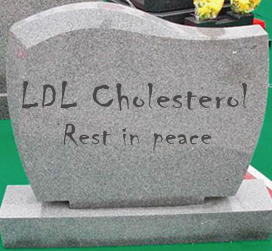Ginnie came in for an opinion about her heart scan score of 393. At age 57, this put her in the 99th percentile, a high score.
As usual, we did a lipoprotein analysis by NMR (Liposcience). Some numbers:
LDL cholesterol: 96 mg/dl
This value puts Ginnie's LDL in the most favorable 25% in the country.
LDL particle number: 2140 nmol/l
This value is in the worst 25% of the country and is the equivalent of an LDL cholesterol of 214 mg/dl (take off the zero).
In addition, over 90% of Ginnie's LDL particles fell into the small class.
Had we run some other values, how would they have turned out? These are my estimates (since we didn't actually run them in Ginnie), but having run side-by-side numbers in past, reasonable estimates would have put:
Apoprotein B somewhere in the 120 to 140 mg/dl range
Direct LDL 100-130 mg/dl range.

In other words, conventional calculated LDL is the least reliable of all the ways of examining low-density lipoprotein.
It can also go the other way: High calculated LDL, low LDL particle number or ApoB or direct LDL. And, indeed, these other measures have proven superior in their ability to predict "events" like heart attack over conventional calculated LDL.
Unfortunately, relying on conventional LDL is like a broken speedometer on your car. You really can't gauge accurately how fast you're going; sometimes you could be way off. While insurance companies and many physicians still continue to balk at this argument, the data have already been generated that show that lipoprotein analysis (my bias is NMR) is not just superior, but enormously superior for accuracy and event prediction.
In addition, lipoprotein analysis has proven a crucial tool that accounts for our extraordinary success in reducing and controlling CT heart scan scores in the Track Your Plaque program. I doubt that we could have achieved the same level of success using conventional lipids.
I'm also aware of the logistical difficulties obtaining lipoprotein testing in a world enthusiastically supportive of hospital procedures and smugly ignorant of superior prevention tools like lipoprotein analysis. I've learned just how difficult it can be in our Track Your Plaque Member Forum; I've also learned about some strategies for obtaining these tests that I hadn't been aware of, thanks to the resourcefulness of our Members.
We will be working on some solutions in the coming months.
Copyright 2007 House, MD